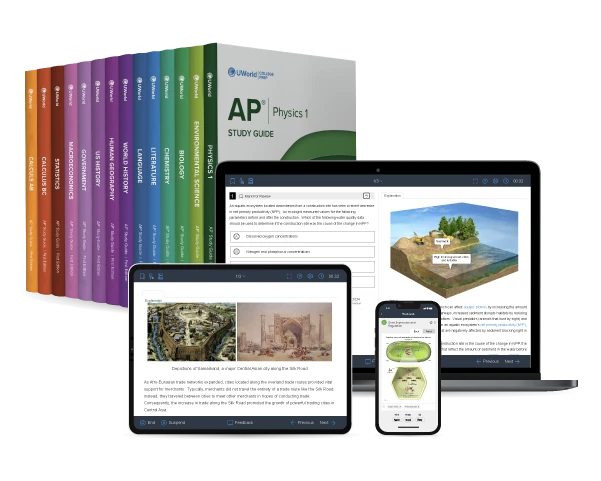What Is Advanced Placement?
Advanced Placement® (AP) is a program created by College Board® for high school students to help them earn college credit and placement. This program1 enables students to take entry-level college courses during high school and earn college credit by scoring well on AP exams given at the end of the courses. The AP program is recognized in the United States, Canada, and other countries worldwide. College Board defines AP as:
“A program that offers students the chance to tackle college-level work while they're still in high school, whether they're learning online or in the classroom. Through taking AP exams, students can earn college credit and placement.”
The program offers courses in various fields of study, such as English, History, Biology, Chemistry, Human Geography, and more. Students can choose courses and take AP classes to prepare for the AP exams. Based on their AP exam scores, students can earn course credits or advanced placement, or both, from colleges and universities that recognize the AP program.
What Are AP Exams?
Advanced Placement exams are college-level exams administered annually in May by the College Board. A student can take this exam after finishing the AP course/s for the subject/s of their choice.
AP courses are offered at most high schools; however, students can take AP exams even if they study on their own. College Board allows students to enroll in multiple AP courses and take multiple AP exams in the same academic year. Results for the AP exams usually come out in July.
How Many AP Exams Are There?
As of 2026, students can take College Board AP exams for 40 courses2. Each course is categorized under 1 of the following 7 disciplines:
- AP Capstone Diploma Program
- Arts
- AP English
- History and Social Sciences
- Math and Computer Science
- Sciences
- AP World Languages and Culture
Want to learn more? Our page on AP courses can guide you in choosing the right fit!
Why Take AP Exams?
Do College Board AP exams give you an edge? Yes! While not required for college admission, acing AP exams boosts confidence and demonstrates your academic potential. Scoring 3+ on AP exams often earns you college credits, allowing you to skip introductory courses and enter higher-level ones. Many U.S. colleges offer these credits, giving you a head start even before beginning your college coursework. This is one of the most significant benefits of taking AP exams in high school.
Planning for your upcoming AP exam? Start your AP journey today with UWorld's AP Exam Prep Courses. Sign up for a free trial today!
AP Exam Format
In general, an AP exam has 2 sections. The first section consists of multiple-choice questions, and the second section has free-response questions. In some courses, such as AP Art and Design, students must submit a work portfolio for scoring.
Section I: Multiple-Choice Questions (MCQs)
The first part of your AP test consists of multiple-choice questions (MCQs) where you must identify the correct answer from 4 or 5 choices given for each question. A raw score is provided based on the number of questions you answered correctly.
TIP: Remember, you won't be penalized for a wrong answer. Your score is based only on the number of correct answers. So, even if you are unsure of the correct answer, be sure to take your chance and answer every question! Usually, the time allotted for the MCQ section is between 60 and 90 minutes, depending on the subject.
Section II: Free-Response Questions (FRQs)
The second part of your AP exam consists of free-response questions (FRQs) where you write your responses. There are 2 types of FRQs: short-answer and long-answer questions. This section will assess your analytical and problem-solving skills. As the name suggests, the free-response section gives you flexibility in answering. The time allotted for this section ranges from 60 to 90 minutes, depending on the subject you've chosen.
Most AP Exams provide a 10-minute break between the two sections.
AP Exam Digital Format
In 2026, the College Board offers 2 formats for the Advanced Placement exams: digital and hybrid.
- Digital AP exams: Students complete the MCQ and FRQ sections in the BluebookTM digital testing app. These exams do not require drawing or graphing; such skills are assessed through questions with pre-provided graphs or stimuli. The app provides all necessary symbols for typing responses.
- Hybrid AP exams: Students take the MCQ section in the Bluebook app but write their FRQ answers in paper booklets provided.
How Are AP Exams Scored?
AP exams are scored on a 5-point scale. This scale determines how qualified a student is to receive college credit and placement. Here's what the AP score sheet looks like:
| AP Score | Recommendation | Equivalent College Grade |
|---|---|---|
| 5 | Extremely Well-Qualified | A+ or A |
| 4 | Well Qualified | A-, B+, or B |
| 3 | Qualified | B-, C+, or C |
| 2 | Possibly Qualified | — |
| 1 | No Recommendation | — |
AP exam scores are based on raw points earned in each section, with varying weights depending on the subject. These scores are combined into a composite score, usually over 100 points, which is then converted to a scale of 1 to 5. This final score appears on your transcript and is not curved. Most colleges accept a score of 3+, though some require 4 or 5 for credit. Aim for at least a 4, and check the score requirements of your preferred college as you prepare.
If you're curious to know more, check out our AP Exam Scoring page for more in-depth information.
What Is the AP Exam Schedule?
The AP exams are administered over 2 weeks in May each year. College Board also administers AP exams on late-testing dates for students who are not able to take the test on the scheduled dates due to an emergency.
Note that if you are self-studying for an AP exam, you need to contact a participating AP school no later than November 15 to register for exams to be administered the following May.
Taking the AP exam soon? Check out our AP Exam Schedule and Dates page for the latest exam schedule and test dates.
Who Is Eligible to Take AP Exams?
High school students worldwide can take AP exams. If your school offers AP classes, you can enroll and take the exams.
Most students start in 10th grade. Some students begin in 9th grade, which is generally discouraged due to the rigorous, college-level material.
You don't need to enroll in AP classes to take the exams. Independent study and homeschooling are both viable options. Use the AP Course Ledger on the College Board website to find schools near you that offer and administer AP exams. Shortlist multiple schools, then contact their AP coordinators by November 15 to confirm if they accommodate independent or homeschooled students.
The AP coordinator manages your exam materials, schedule, location, and fees. Note that test centers may have additional rules beyond College Board policies. College Board also offers accommodations for students with disabilities. For further details, read our guide to AP Exam Eligibility and Registration.
Retaking the AP Exam?
The good news is you can retake an AP exam in the subsequent year if you are not satisfied with your current AP score! Remember to declare the score you wish to cancel/withhold, or both scores will be reported.
What happens if you don't take the AP exam?
If you have paid for an AP exam but did not take it, you will be charged a fee for the unused exam kit, and the balance will be refunded.
What happens if you can't take the AP exam on your scheduled date?
If an unexpected issue or crisis prevents you from taking the exam on your scheduled date, you can contact your AP coordinator, who will advise if a late testing date is available.
What happens if you fail an AP exam?
AP exams aren't pass/fail. Even if you score a 1 or 2, there are still benefits. Studies show that students who take the AP course and score low on the exam often perform better in related college courses than those who didn't take AP at all. Also, low AP scores do not hurt your chances of college admission. Most schools focus more on the fact that you challenged yourself with rigorous coursework.
How to Study for AP Exams and Classes
Many top students begin their AP prep in the summer before school starts or in the fall, prepping ahead of each unit covered in class, gradually increasing their exam prep efforts after winter break. As spring approaches, February is when most students intensify their study routine. Since AP classes are more challenging than standard high school courses, regular preparation is key to success. Here's a checklist to help guide your studies:
- Create a schedule: Plan 3–4 months ahead for structured study and ample review time.
- Review old materials: Spend 20–30 minutes daily to revisit past content for better retention.
- Focus on weaknesses: Focus on topics you struggle with most for big score gains. On lighter prep days, sharpen your strengths for instant confidence.
- Take notes year-round: Jot down key points during the school year to simplify later reviews.
- Practice extensively: Supplement your studies with AP prep resources and practice questions for targeted guidance.
Early planning and consistent effort can make reaching a 5 achievable! For more tips, check out our article on a step-by-step guide to AP exam prep.
What Are the Most Popular AP Exams?
Are you curious to know about the most popular subjects for AP exams? According to the College Board's social media updates, these 11 AP exams were the most popular among students in 20253:
What Are the Most Difficult AP Exams?
Courses such as Physics C – Electricity & Magnetism, Chemistry, U.S. History, Biology, and English Literature are known for their challenging content and extensive knowledge requirements. However, even “easier” AP courses can result in lower exam scores due to factors such as overconfidence, a mismatch with a student's abilities, lack of interest, test anxiety, poor preparation, or external pressures.
Interestingly, when examining the 2025 data3 on AP exam success rates, some courses initially perceived as less challenging emerged as among those with the lowest pass rates:
*This list excludes Foreign Language, Arts, Research and Seminar subjects.
Thinking about how to score high? Take your AP prep to the next level! Join thousands of students using UWorld AP exam prep to level up their scores and boost exam day confidence.
What Are the Easiest AP Exams?
Courses such as AP Psychology, AP Computer Science Principles, AP Environmental Science, AP Human Geography, and AP Microeconomics are often considered more accessible because their content closely relates to everyday experiences and broader concepts.
Analysis of the 2025 AP exam success rates3 revealed that some courses traditionally viewed as challenging had some of the highest pass rates:
*This list excludes Foreign Language, Arts, Research and Seminar subjects.

Read More About the AP Exams
Choosing the right AP course is a key step toward starting your dream career quicker! Discover the benefits of AP classes, explore popular options, and get expert tips in this comprehensive guide.
AP Exam ScoringYour ultimate guide to decoding AP exam scores! Discover how AP exams are graded, explore score distributions, and learn how your scores can boost your college prospects.
AP Exam Schedule & DatesStay ahead with the complete AP exam schedule and dates. Plan your study time and prepare effectively for success and the desired score on your AP exam.
AP Exam Eligibility & RegistrationDiscover who is eligible to take AP exams, how to register, important deadlines, fees, and tips for a smooth registration process. Prepare confidently for your AP exam success!
AP Exam Policies & AccommodationsAce your AP test day with confidence! Learn everything you need to know about test day regulations, approved tools, accommodations, and special provisions for a seamless experience.
How to Study for AP ExamsBoost your AP prep the smart way! Explore active learning strategies and techniques, visual aids, flashcards, and more in this ultimate guide to scoring high on your AP exams.
References
- College Board. (n.d.). What is AP? AP Students. Retrieved from
https://apstudents.collegeboard.org/what-is-ap - College Board. (2025). How Many AP Courses Are There?. Retrieved from
https://blog.collegeboard.org/how-many-ap-courses-are-there - College Board. (2025). 2025 AP Score Distributions. AP Students. Retrieved from
https://apstudents.collegeboard.org/about-ap-scores/score-distributions







